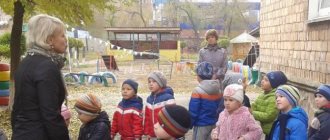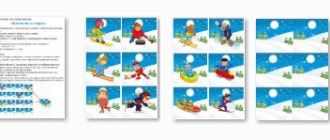Acclimatization
Children in Cyprus
Children endure climate change more difficult than adults and adapt in up to two weeks. How to shorten and facilitate adaptation?
- Travel to a region with a similar climate.
- Do not change the standard time by more than 2 hours.
- To travel in hot climates, choose the off-season.
- Try to arrive early and get used to the new area.
- Let me get some sleep.
- Give your child more vegetables and fruits, but don’t get carried away with unusual ones.
- Drink water more often.
- Returning to the cold, do not rush to walk.
- Don't rush to kindergarten. Rest at home for a few days and let your baby sleep longer.
An excellent option in the south without the heat is the Elbrus region with children. And the mountains are in full view, and there are no problems with adaptation.
Station ECOLOGICAL
Baba Yaga: - What's that noise? What's all the fuss? Who are you and where did you come from? Well, turn back! I won't let you in! There are all kinds of people walking around here! The forest is being littered!
Educator: - We are not just anyone, we are tourists!
Baba Yaga: - Those guys also called themselves tourists, but look what they did! And what a clearing it was! I frolicked here as a child, when I was only a hundred years old! Oh! What was the air like! Aroma! And now? That piece of paper will lie for three years, or maybe more, until nature digests it. And this plastic bottle will not disappear even in fifteen, or even twenty years. What are you watching? Go away, I said I won’t let you in!
Educator: - Dear Baba Yaga, our guys know how to behave in the forest.
Baba Yaga: - And we’ll check this now.
Ecological signs.
Baba Yaga will test children's knowledge of environmental signs:
- Don't trample flowers or grass.
- Carefully extinguish the fire when leaving the resting place.
- Don't shout, don't play loud music.
- Don't tear up the cobwebs.
- Don't break tree branches.
- Don't destroy birds' nests.
Baba Yaga: - Well, tell me, where to put the garbage after yourself?
A competition is being held to see who can collect the trash the fastest.
Children put on gloves, take garbage bags and, when given a signal, quickly put garbage in them.
Baba Yaga:
- I will tell you from the bottom of my heart - All the guys are good! They cleared a clearing for me.
- Look at this fire. Did his previous children prepare him correctly? What is missing?
The competition “Cover the fire with stones” is being held.
Baba Yaga: - Well done, guys! We completed the task. Goodbye! It's time for you to continue on your way.
What if something happens?
Mom is on guard for safety.
The biggest fears are in the head. Properly organized trekking is no more dangerous than a children's playground, but for this, everyone must follow the rules of the trek.
Discuss with your child in advance what to do:
- obey you and the instructor;
- be near;
- do not touch unfamiliar plants and wild animals;
- talk about all your experiences.
For extra safety, pack a first aid kit. Watch your baby carefully and everything will be fine.
Changing your daily routine
The hike gets up earlier. Source: katerinacost.ru
Children's sensitivity to routine varies: some sleep whenever they can, while others schedule their day minute by minute. It will not be easy for the last ones on the hike - we choose family trekking and stick to the usual schedule.
But even here there are no surprises. The baby may sleep twice instead of once or not sleep until the evening. Passengers of ergo backpacks sleep on the move and frolic in the parking lot.
Calm, just calm! Adaptation will take place and everything will work out.
How to organize a baby's nap during a hike?
The baby fell asleep in the carrier and is resting on the mat.
When preparing for a group hike, check with the organizers about the approximate daily routine and age of the children who have signed up.
At home, shift your routine by 15 minutes in both directions.
A good rest is sleeping on a flat surface. If you notice that the baby is nodding off, put him on the mat and rest yourself.
Station TOURISTIC
Lesovichok: - Hello, guys! You came to me on foot. Do you know what else you can travel on? What types of tourism exist?
Children: - Water, horseback, ski, automobile.
Lesovichok: - Correct! Only when traveling can dangers await you, and you must know how you can help yourself and others.
Lesovichok asks the teams questions. For each correct answer the team is awarded a piece of paper.
Tasks on knowledge of rules of conduct in the forest:
- If you scratch yourself in the forest, but you don’t have iodine or brilliant green with you, what can you use to lubricate the scratch?
- If you are bitten by a wasp, what will you do? - You need to pull out the sting, lubricate the bite site with soap.
- If you hurt your knee badly, what will you do? - You need to wash the wound, treat it, bandage it.
- If you find a tick on your body, what will you do? — You need to tell an adult, lubricate the skin with oil, and when the tick starts to emerge from under the skin, you need to carefully pull it out with a needle and consult a doctor.
When going to the forest for nature, remember the safety rules:
- Wear clothes that fit your body tightly.
- The jacket must be tucked into trousers, a scarf, a hood, and a cap on the head.
- When you return from the forest, immediately examine your body. The best way to see an attached tick is in the sun. If you find a tick on your body, immediately inform an adult about it - you cannot cope with this problem yourself.
- If you get a thorn under your skin, what will you do? - You need to tell an adult, treat the needle with alcohol and pull out the splinter with a needle.
- What to do if you hit your head and get a bump? - You need to apply something cold: a cold spoon, a handkerchief soaked in cold water, a wet newspaper.
- What to do if you are bitten by mosquitoes? - You need to lubricate the bites with brine - salt water. This will help reduce itching.
- What to do if you meet a wild animal in the forest? - You can't run away. It is best to freeze, then the beast will go its own way. If an animal is about to attack you, call an adult for help and climb a tree.
Lesovichok: “ I want to offer you horseback riding today.” What will this type of tourism be called?
The relay race “Equestrian tourism” is held.
Children gallop at a straight pace, racing in pairs to a landmark and back.
Lesovichok: - Well done, guys! We completed the task. Goodbye! It's time for you to continue on your way.
How to prepare for a hike with a child?
The kids were well prepared!
Remember: you are going on a hike for a good mood. Create it in advance and don’t lose it along the way.
Think through the logistics and route. If they were developed in advance, refresh the information. If you go with a group, check to see if there are any changes.
Write a list of equipment - take into account the experience of others and decide for yourself what to take for a comfortable stay. Consider the weather forecast. Take your favorite toy, but don’t overdo it with entertainment: there is plenty of it in nature. Think about what games to play while camping.
Tell your child about the upcoming event - explanations are useful even for a baby.
Relax on the eve of departure: busy days lie ahead. Good luck!
Unusual environment
Games in a new environment
Children, especially toddlers, are sensitive to their surroundings. Some sleep anxiously in an unfamiliar place, others are more capricious during the day. The following will help calm your baby:
- Worry less yourself: the baby reads the parents’ state.
- Prepare in advance for camping with children. Let them play in a tent at home. Go spend the night in the nearest forest.
- For a night's sleep, it is important to choose the right sleeping bag: it is not only a blanket, but also a house for the baby.
- If your child is afraid of the dark, set up camp early on an overnight camping trip. In a tent with a cozy flashlight, the night is not scary.
- A favorite toy gives a feeling of home and reduces anxiety.
- Tell us about your upcoming trip. Focus on joyful events: what you will do and what new things you will see.
- Increase the duration and complexity of the trip gradually.
- Life among strangers is not easy for introverted children. Start by traveling in a small group. On group hikes, pay more attention to the kids and place the tent in a secluded corner so that the kids have their own space. Perhaps staying in small houses, such as in family Turkey, is more suitable for you.







